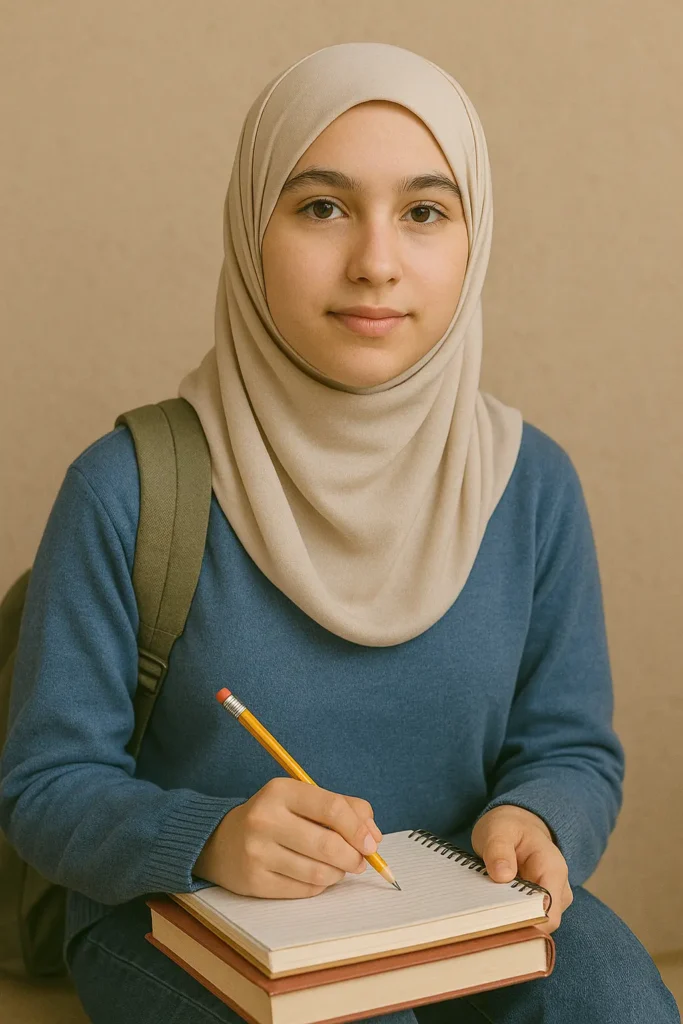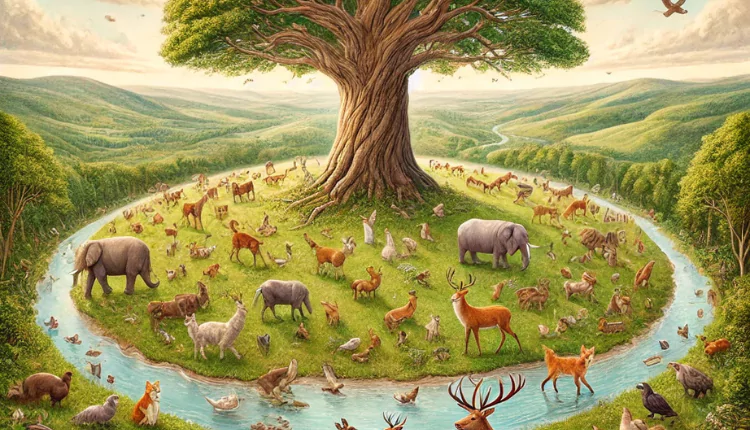In a remote valley, cradled by towering, snow-capped peaks, lay the hidden city of Valoria; it itself was a city of stone, blended seamlessly with nature. The melted snow flowed with the flow of rivers, which trickled down from the peaks, weaved through the city like veins of silver, and immersed the air with the soothing sound of running water. The dimmed sunlight glorified the city in a golden tinge colour, making the mountains appear more majestic. Progressing at a gentle pace through the cobbled pathways, approached the central square, illuminated by a lively fire. Within the core of the city’s warmth and energy lived two sisters, Christie and Anastasia.
Even though their attentive parents nurtured the sisters in a warm environment, their personalities diverged markedly. Christie, the older sister, was recognized for her kindness and authenticity. Anastasia was frequently described as having a playful and mischievous disposition. In contrast, despite sharing the same background, she developed traits of cunning and selfishness. She harboured jealousy towards her sister’s gentle demeanour and frequently engaged in manipulative and hurtful tactics to achieve her desires, perceiving kindness as a flaw and innocence as a form of naivety.
Anastasia frequently irritated Christie by engaging in behaviours that caused her discomfort. For example, she would conceal Anastasia’s art and science books, eat the foods that Anastasia had kept for herself, and blast loud music while her sister was trying to read and study.
One day, the neighbouring village was hit by a severe drought. The crops failed, and water became increasingly limited. The villagers had to band together to survive the crisis. Christie, as always, went out of her way to support them, sharing her meagre resources with the less fortunate and the elderly. Her generosity only endeared her further to the community. Conversely, Anastasia seized the drought as a business opportunity. She accumulated her food and water supplies, selling them to the needy villagers at inflated rates.
When Christie confronted her about her actions, Anastasia scoffed at her sister’s selflessness.
“Why did you sacrifice so much when you could have it all?” Anastasia mocked. “In the end, you’d end up with nothing.”
Christie, stung by his sister’s harshness, responded,
“What I offered was moral support, and what I practised was a precious value that no amount of money can possess.”
As the days went by, the drought intensified, leaving the villagers in a state of increasing despair. Despite their struggles, acts of Christie’s compassion made quite a difference.
One evening, an elderly beggar approached the sisters’ home in search of refuge and sustenance. Initially, Anastasia, feeling annoyed, dismissed him, claiming they had nothing to offer. However, recalling her mother’s lessons, Christie ultimately welcomed the old man inside and presented him with their final piece of bread. As the beggar ate, he revealed himself to be a mystical sage in disguise. Touched by Christie’s kindness, he blessed her with endless prosperity.
From that moment on, every act of generosity Christie performed multiplied her fortune. Her fields grew lush crops, and her well overflowed with water even though the drought continued. Anastasia, seeing her sister’s newfound wealth, was consumed with envy.
She went to the sage, demanding to be blessed as well. But the sage, aware of her wickedness, said, “What you sow is what you reap. You hoarded resources and harmed those around you, and so you shall receive nothing in return.”
Upon hearing all of this, Anastasia became furious and spent the entire day taunting Christie. A few days later, both sisters went to the seaside village. Unexpectedly, Anastasia shoved Christie into the sea, but she managed to prevent herself from falling. Overcome with anger towards her little sister, she made the decision to stop speaking to her altogether.
“I am hurt; do not approach me,” she stated. When the sisters hadn’t spoken for a few days, Anastasia recognized her mistakes and made an effort to change her behaviour; however, Christie’s demeanour did not alter.
Consequently, Anastasia lost all hope and started spending the whole day sitting sadly in their garden. Christie, on the other hand, observed her sister from the window while she sat alone on the bench, sobbing quietly.
At that time, Anastasia reflected on how her actions were unpleasant and how she had not offered anything to the needy and became so ruthless. This was not what their mother had taught her.
Finally, after realizing how wrong she was, she went up to her sister, her eyes brimmed with tears, the weight of her past actions weighing her down. “I was selfish. I hoarded food, everything that could have helped you. I thought keeping it would protect me, but it only isolated me.”
Her hands shook as she reached down and opened one of the boxes she had taken with her. “It’s filled with food, clothes, and blankets. You can hand them out to the villagers.” Tears kept streaming down her face as she spoke. “I am sorry, truly sorry. I was so focused on my own survival that I forgot what it means to be human, to share, and to help. I’ve realized now that all these things mean nothing.”
Christie’s heart melted, and she forgave her sister, giving her a warm, tight hug. “Don’t worry, Ann, I have forgiven you. I just wanted you to realize your mistake, and I don’t need any of your things.”
Anastasia said, “No, I have now realized the Power of Selflessness: it makes everyone happy whereas selfishness leaves you with nothing but loneliness.”
The two sisters embraced each other with tears in their eyes and vowed to rise above their selves and enrich others’ lives, earning true happiness.
Selflessness stands as one of the highest virtues. It allows us to rise above resentment and pride because it reflects strength, humility, and compassion. It not only enriches others’ lives but also liberates our hearts from the limitations of selfishness, allowing love, compassion, and empathy to triumph over greed and isolation. When we give, we recognize the shared humanity in others. In this way, selflessness paves the way for stronger relationships, personal liberation, and the ultimate triumph of love over pain.
The Power of Selflessness: A Moral Discussion
In the compelling short bedtime story “The Power of Selflessness,” readers are introduced to two sisters, Christie and Anastasia, who embody contrasting values. While Christie exemplifies kindness and generosity, Anastasia’s actions are driven by selfishness and manipulation. The narrative unfolds during a severe drought in their village, highlighting the consequences of their choices.
Christie’s selfless acts, such as sharing limited resources with those in need, lead to unexpected blessings, demonstrating that true wealth lies in compassion. In contrast, Anastasia’s greed isolates her from the community, emphasizing the emptiness of selfish pursuits. This story underscores the timeless lesson that selflessness not only enriches others but also brings fulfilment to oneself.
For parents seeking short bedtime stories for kids, this tale offers a valuable lesson in empathy and the importance of helping others. It encourages children to understand the significance of kindness and the positive effects of selfless actions. As for short bedtime stories for adults, “The Power of Selflessness” serves as a strong reminder of the value of compassion in our daily lives: it encourages reflection on how we can contribute to the well-being of others and the community.
In other words, this short bedtime story transcends age, imparting timeless values of generosity, empathy, and the enduring power of selflessness.
Craving bedtime fairytales that charm and calm before sleep?
Join Storyious and uncover a collection of relaxing Bedtime Stories that blend classic charm with a modern touch. Each nighttime tale is thoughtfully written to engage young minds and gently lull them into a state of relaxation. With a sprinkle of enchantment and a hint of whimsy, these stories provide a safe haven from everyday worries and are ideal for families seeking a quiet, reflective end to the day, offering both fantasy and solace. Enjoy an evening ritual that not only entertains but also fosters a loving atmosphere, ensuring that every night is a journey into a land where dreams are nurtured and imaginations soar.







Comments